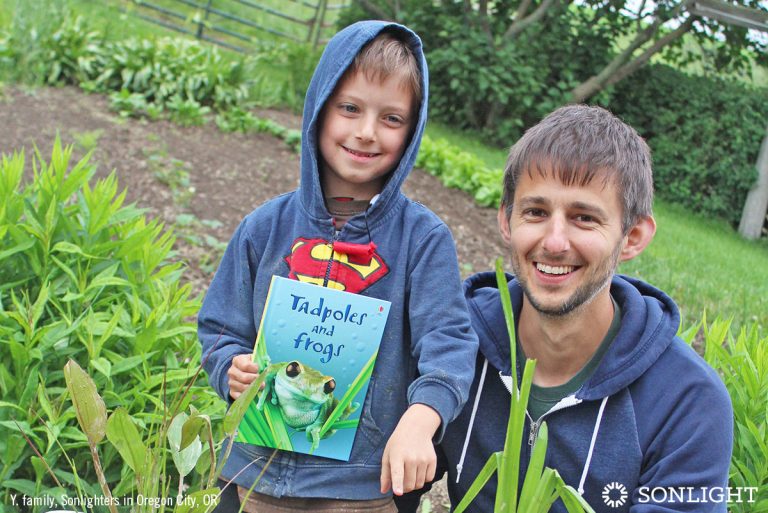
Luke (5) wanted to make his own pond to watch tadpoles grow. He is pictured with his father, Brendon. —Y. family, Sonlighters in Oregon City, OR
What I lack in sensitivity, I make up in hubris. My children frequently have to put up with my bluster and emotional dullness. But here are a few difficult phrases that I and my fellow homeschool dads can keep in our back pockets to help us raise our arrows.
1. “I need help.”
So often I say with my tone of voice what I am afraid to say with words. I scowl and jeer at a messy bathroom floor rather than addressing it directly.
The mess returns every evening until my scowls accumulate into an outrage. From the perspective of my children, they do something permissible, until one day, it’s suddenly both impermissible and, indeed, outrageous. What a confusing contradiction.
The result is they end up feeling they need to manage the emotions of their parent, rather than fulfill their responsibilities. The solution is to express my feelings as clearly as I can and arrive at a fair division of labor.
The problem is that there is a part of me that thinks my sheer existence as an authority figure and hard-worker should elicit the same diligence in those around me, even in young children, without so much as a mention of the task, let alone a thank you.
Saying "I need help" is difficult, but essential.
2. “That makes me feel that you don’t like me.”
This is a scathing-hot iron to my ego. When I attempt the accents in earnest for their Read-Aloud, coming up to an exciting part of the story, and the crescendo is lost in a peal of laughter at unrelated silliness, I’m irritated, of course, at having to repeat that part of the story. But more than that, it makes me feel like they don’t care about my efforts, or even don’t like me.
That doesn’t make sense, so it’s embarrassing to acknowledge the feeling. I direct it as vague ire towards them, which they internalize as vague disapproval. This whole chain can be short-circuited if I look my emotions straight in the face and articulate them carefully.
It's hard to recognize that my children have hurt my feelings, but I need to face the experience.
3. “I should have listened to you.”
My 4-year-old wanted to bring left-over pasta on our walk to the park. I didn’t want to bring a backpack, so we left without either. We ended up in a forest next to the park, playing pirates. It didn’t take long, however, for us to get irritable without a snack. Tears ensued, and the game was cut short.
Instead of apologizing for not bringing a snack, I snapped at them for having, of all things, a short fuse.
The really hard thing about I’m sorry for a daddy is that it means relinquishing a certain amount of moral control.
In order to lead, we have to be trusted to have the insight to make decisions that benefit the family. If that insight fails, daddy takes one of three paths.
- The easiest path is to deny the failure in the first place, and blame someone else.
- The second path is to acknowledge the failure but give up, saying, "I am hereby no longer fit to lead."
- The third is the most strenuous and asks others, "Stay with me in the midst of my failures as I work on improving myself for your good."
4. “You’re safe with me.”
Dads tend to be good at pushing into the unknown. We encourage risk-taking, experimentation, and hard-work. It’s usually mom who calls the kids home for supper — to rest and safety. That feeling of safety in your mother’s arms is not just nice, but neurologically crucial.
The balance, however, of safety and risk-taking needs to be re-calibrated when daddy is the one who’s at home full-time (as is my situation).
Sometimes a father's desire to see his children achieve must take a backseat. He must hug through his child’s tears without explaining why the tears are misguided. Children must know that whatever happens out there in the wild, Daddy is Daddy:
"I will always be daddy. You cannot earn that and you need not overcome anything to secure that. Run to me, and I will fight the monsters. Come home, and the kettle will be on. You are my beloved children."
5. “You are beautiful.”
- This is more than "You look pretty today."
- It is not "You look nice with the right outfit and the right diet."
- It’s not even "You will become a beautiful woman."
These reserved messages allow daddy to protect himself against illusory rejection. But reaching out with unreserved affection is very self-revealing and leaves daddy vulnerable to his son or daughter.
But when a child sees a daddy, confident to face the possibility of rejection, it communicates that she must be worth an awful lot. Her beauty is so treasured that she is worth seeking and protecting for the simple joy of her presence. The Father would give Himself to be with her and know her, even if it means covering a multitude of sins.
Choose a curriculum the whole family can enjoy together!








